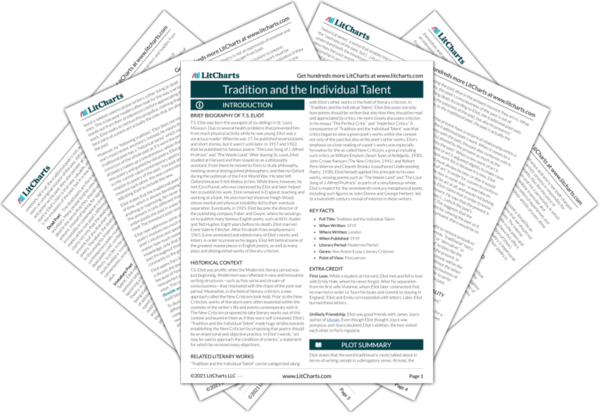T.S. Eliot Quotes in Tradition and the Individual Talent
We endeavor to find something that can be isolated in order to be enjoyed. Whereas if we approach a poet without this prejudice we shall often find that not only the best, but the most individual parts of his work may be those in which the dead poets, his ancestors, assert their immortality most vigorously.

Unlock explanations and citation info for this and every other Tradition and the Individual Talent quote.
Plus so much more...
Get LitCharts A+This historical sense, which is a sense of the timeless as well as of the temporal and of the timeless and of the temporal together, is what makes a writer traditional. And it is at the same time what makes a writer most acutely conscious of his place in time, of his contemporaneity.
To conform merely would be for the new work not really to conform at all; it would not be new, and would therefore not be a work of art. And we do not quite say that the new is more valuable because it fits in; but its fitting in is a test of its value.
The poet must be very conscious of the main current, which does not at all flow invariably through the most distinguished reputations. He must be quite aware of the obvious fact that art never improves, but that the material of art is never quite the same.
But the difference between the present and the past is that the conscious present is an awareness of the past in a way and to an extent which the past’s awareness of itself cannot show.
What happens is a continual surrender of himself as he is at the moment to something which is more valuable. The progress of an artist is a continual self-sacrifice, a continual extinction of personality.
The mind of the mature poet differs from that of the immature one not precisely in any valuation of “personality,” not being necessarily more interesting, or having “more to say,” but rather by being a more finely perfected medium in which special, or very varied, feelings are at liberty to enter into new combinations.
The more perfect the artist, the more completely separate in him will be the man who suffers and the man who creates; the more perfectly will the mind digest and transmute the passions which are its material.
[The traditional poet’s] emotions may be simple, or crude, or flat. The emotion in his poetry will be a very complex thing, but not with the complexity of the emotions of people who have very complex or unusual emotions in life.
Poetry is not a turning loose of emotion, but an escape from emotion; it is not the expression of personality, but an escape from personality. But of course, only those who have personality and emotions know what it means to want to escape from these things.

T.S. Eliot Quotes in Tradition and the Individual Talent
We endeavor to find something that can be isolated in order to be enjoyed. Whereas if we approach a poet without this prejudice we shall often find that not only the best, but the most individual parts of his work may be those in which the dead poets, his ancestors, assert their immortality most vigorously.

Unlock explanations and citation info for this and every other Tradition and the Individual Talent quote.
Plus so much more...
Get LitCharts A+This historical sense, which is a sense of the timeless as well as of the temporal and of the timeless and of the temporal together, is what makes a writer traditional. And it is at the same time what makes a writer most acutely conscious of his place in time, of his contemporaneity.
To conform merely would be for the new work not really to conform at all; it would not be new, and would therefore not be a work of art. And we do not quite say that the new is more valuable because it fits in; but its fitting in is a test of its value.
The poet must be very conscious of the main current, which does not at all flow invariably through the most distinguished reputations. He must be quite aware of the obvious fact that art never improves, but that the material of art is never quite the same.
But the difference between the present and the past is that the conscious present is an awareness of the past in a way and to an extent which the past’s awareness of itself cannot show.
What happens is a continual surrender of himself as he is at the moment to something which is more valuable. The progress of an artist is a continual self-sacrifice, a continual extinction of personality.
The mind of the mature poet differs from that of the immature one not precisely in any valuation of “personality,” not being necessarily more interesting, or having “more to say,” but rather by being a more finely perfected medium in which special, or very varied, feelings are at liberty to enter into new combinations.
The more perfect the artist, the more completely separate in him will be the man who suffers and the man who creates; the more perfectly will the mind digest and transmute the passions which are its material.
[The traditional poet’s] emotions may be simple, or crude, or flat. The emotion in his poetry will be a very complex thing, but not with the complexity of the emotions of people who have very complex or unusual emotions in life.
Poetry is not a turning loose of emotion, but an escape from emotion; it is not the expression of personality, but an escape from personality. But of course, only those who have personality and emotions know what it means to want to escape from these things.











